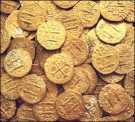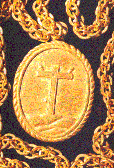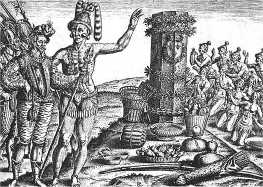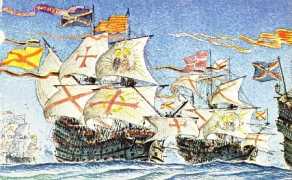The
Spanish Conquistadors
Gold,
Glory, And GOD
Unknown to the Indians of Florida,
their destiny was being determined by political
and economic forces taking place across the Atlantic
Ocean in Europe. At the end of the fifteenth century,
thousands of daring adventurers would be crossing
the ocean to conquer within a few centuries what had taken the
Indians thousands to years to inhabit.
conquer within a few centuries what had taken the
Indians thousands to years to inhabit.
 The
conquistadors of Spain who ventured into the lands
of the Indians were motivated by many forces.
The discovery of gold in Mexico and Peru caused
thousands of impoverished Spanish peasants to
join the military. Under the rules of primogeniture,
younger sons of the nobility would not inherit
much of the family estate, but leading a successful
colonial mission could give you the funds to build
a castle. The
conquistadors of Spain who ventured into the lands
of the Indians were motivated by many forces.
The discovery of gold in Mexico and Peru caused
thousands of impoverished Spanish peasants to
join the military. Under the rules of primogeniture,
younger sons of the nobility would not inherit
much of the family estate, but leading a successful
colonial mission could give you the funds to build
a castle.
Others sought glory and fame,
now that the wars with the Moors were over. Only
in the New World was there the opportunity for
quick advancement in the Spanish military and
diplomatic careers.
 Finally,
there were those who came for spiritual reasons.
They were more than just the priests and church
leaders. Catholic Spain had a strong missionary
zeal, for they had engaged the Muslim infidels
for four centuries. The eternal blessing of God
would be earned by converting the Americas into
Catholic lands. Finally,
there were those who came for spiritual reasons.
They were more than just the priests and church
leaders. Catholic Spain had a strong missionary
zeal, for they had engaged the Muslim infidels
for four centuries. The eternal blessing of God
would be earned by converting the Americas into
Catholic lands.
This Site describes the 15 year
Conquest of Native America. Cabeza de Vaca's eight
years in North America, starting in 1528, set
the stage for Coronado and Hernando de Soto to
lead armies deep into America in the 1540's: Coronado
from Mexico City and DeSoto from Cuba, Spain's
"Ellis Island." Vaca was the first European
to describe this continent, but only near its
southern shoreline. DeSoto, at age 39, was rich
from Incan gold and wanted to colonize North America.
To do so, he planned to open a passage to trade
Spain's New World fortunes with China, the largest
supermarket in the world.
 Intelligent
Indians had told Vaca of a northern sea that DeSoto
believed was the Pacific Ocean, the sea Balboa
discovered beyond Panama, DeSoto's boyhood home.
Magellan had sailed that sea to the Orient when
DeSoto was 21 years old, but lost his life on
that long voyage. DeSoto wanted to build a port
on America's Northern Sea, then sail what he believed
was a short distance across it to China. He planned
to protect his "Northern Passage to China"
from Mobile Bay, Alabama, which Vaca had visited
and DeSoto planned to use as Spain's new "commanding"
stronghold in America, home for his settlers and
a beacon for New World settlement. Intelligent
Indians had told Vaca of a northern sea that DeSoto
believed was the Pacific Ocean, the sea Balboa
discovered beyond Panama, DeSoto's boyhood home.
Magellan had sailed that sea to the Orient when
DeSoto was 21 years old, but lost his life on
that long voyage. DeSoto wanted to build a port
on America's Northern Sea, then sail what he believed
was a short distance across it to China. He planned
to protect his "Northern Passage to China"
from Mobile Bay, Alabama, which Vaca had visited
and DeSoto planned to use as Spain's new "commanding"
stronghold in America, home for his settlers and
a beacon for New World settlement.
 In
March of 1513, Ponce de Leon sailed into the Bahamas
headed toward Florida, then considered by slave
hunters and fishermen to be a large island. He
was seeking a spiritual rebirth with the fountain
of youth, not a physical rebirth with some
wonder water. In
March of 1513, Ponce de Leon sailed into the Bahamas
headed toward Florida, then considered by slave
hunters and fishermen to be a large island. He
was seeking a spiritual rebirth with the fountain
of youth, not a physical rebirth with some
wonder water.
On Easter Sunday, March 27, 1513, his crew sighted
land, probably Abaco Island. Six days later he
reached the Florida coast and sailing northward
to land near St. Augustine. He named the place
"Pescua Florida", "the place of
flowers," perhaps in honor of Easter Sunday.
|
